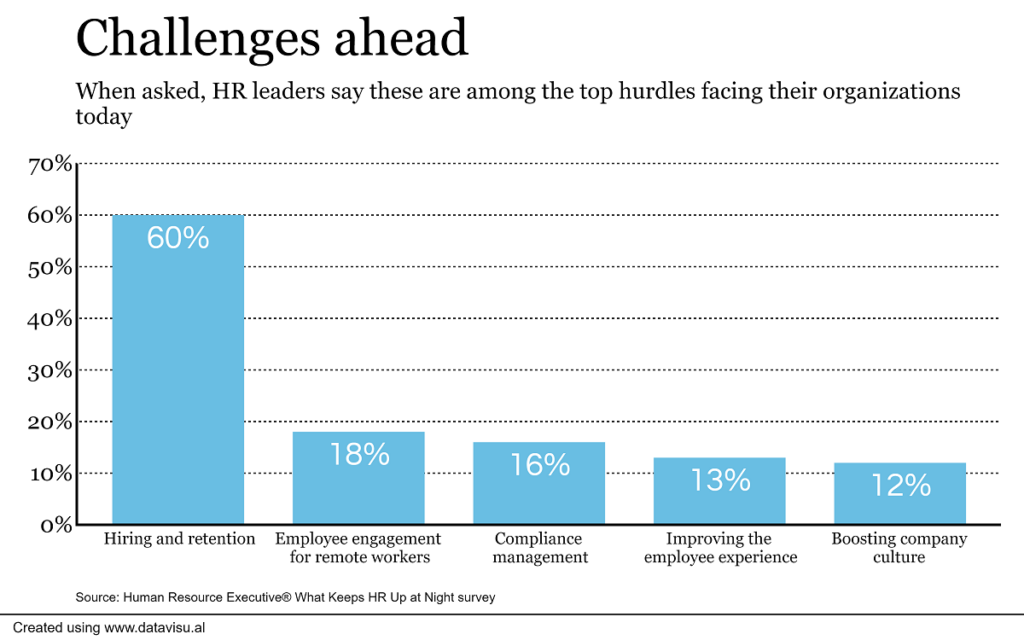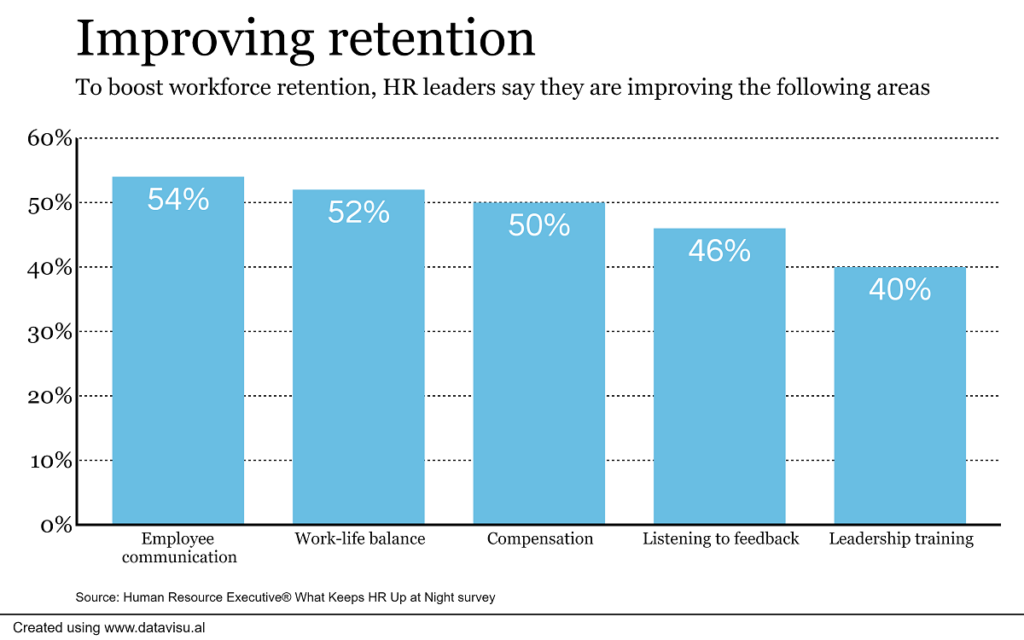Nearly two years of the COVID-19 pandemic have brought unprecedented challenges to employers and changed the way HR and other company leaders do their jobs. But as much as the pandemic has been a struggle for employers in the past year, there’s an even bigger challenge testing HR executives: keeping employees.
Hiring and retaining key talent amid the Great Resignation—in which record numbers of people are leaving their jobs in search of better work experiences—is the biggest HR challenge currently facing organizations, according to results of Human Resource Executive’s annual “What’s Keeping HR Up at Night?” survey. The survey, which polled 820 HR professionals in late November, before the discovery of the highly contagious Omicron variant, found that 60% of respondents cited recruiting and retaining workers as one of their top two challenges. Improving employee morale and engagement in remote/hybrid/socially distanced workplaces (cited by 18% of HR leaders), managing compliance, including expected federal COVID-19 vaccine mandates (16%) and improving company culture (12%) were HR’s other top concerns of 2021.

“The Great Resignation is a monumental challenge for HR leaders,” says Melissa Jezior, president and chief executive officer of Eagle Hill Consulting. “They are facing a Rubik’s Cube of problems that are difficult to solve. And the challenges go much deeper than the labor shortage stemming from the pandemic.”
When asked how concerned they are about losing talent over the next 12 months on a scale from one to five, with five being extremely concerned, the vast majority of respondents (46%) ranked it as a five and 33% ranked it as a four.
“Our turnover has increased dramatically,” wrote one survey respondent. “While some of it may be due to pay, we believe that a lot of employees are unhappy with this new environment that we are in. We must do better to create an engaging hybrid culture.”
Another commented: “We have so many people turning over for higher-paying jobs, and it is an employee’s market right now. Our turnover is projected to be 20% for [2021].”
 HRE’s survey findings come amid reports of scores of employees leaving their jobs. According to the Labor Department, 4.5 million people voluntarily left their jobs in November—the highest number on record. Moreover, many other employees plan to quit in the foreseeable future: Eagle Hill Consulting data, for instance, finds that 27% percent of U.S. employees plan to leave their employer as the COVID-19 pandemic subsides. Add to that the fact that COVID-19 is affecting many other employees and causing them to be out sick or on leave with the virus, and employers find themselves in a labor shortage they’ve never experienced before.
HRE’s survey findings come amid reports of scores of employees leaving their jobs. According to the Labor Department, 4.5 million people voluntarily left their jobs in November—the highest number on record. Moreover, many other employees plan to quit in the foreseeable future: Eagle Hill Consulting data, for instance, finds that 27% percent of U.S. employees plan to leave their employer as the COVID-19 pandemic subsides. Add to that the fact that COVID-19 is affecting many other employees and causing them to be out sick or on leave with the virus, and employers find themselves in a labor shortage they’ve never experienced before.
The pandemic, of course, has contributed to the resignation phenomenon in spades, insiders say. “All the turmoil of recent years has employees re-evaluating their lives and work,” Jezior says, explaining that more than half of the workforce says the pandemic has them reevaluating their priorities and a third say it’s causing them to consider changing careers.
 Furthermore, burnout and other stresses have soared as a result of COVID-19 and its associated challenges, with employees working longer hours, taking less time off, forgoing vacations and dealing with a loss of work-life balance as boundaries blur when they are working remotely.
Furthermore, burnout and other stresses have soared as a result of COVID-19 and its associated challenges, with employees working longer hours, taking less time off, forgoing vacations and dealing with a loss of work-life balance as boundaries blur when they are working remotely.
Related: Don’t miss Carrie Bevis of research firm i4cp talking about improving remote workers’ wellbeing at HRE’s upcoming Health & Benefits Leadership Conference. Register for the event here.
“The pandemic was the straw that broke the camel’s back,” Jezior says. “Employee burnout was simmering long before the pandemic, and now it’s boiled over. [More than half] of working Americans say they are burnt out at work, and that’s just an unsustainable situation for employers who want to keep their workers. Also, employees now have more leverage on salary and benefits, and they often are willing to go to the highest bidder.”
Compliance and COVID-19
Concern over losing employees is not the only worry on HR leaders’ minds. Pandemic-associated challenges—like virus management, managing vaccine requirements and improving employee morale and engagement in remote/hybrid/socially distanced workplaces—also were cited as main concerns in the survey.
 Aside from recruiting (cited by 40% of respondents) and retention (23%), HR leaders say they are spending most of their time on virus management (cited by 20%), talent management (16%) and employee benefits (14%).
Aside from recruiting (cited by 40% of respondents) and retention (23%), HR leaders say they are spending most of their time on virus management (cited by 20%), talent management (16%) and employee benefits (14%).
Sixteen percent of HR executives said they are concerned about managing compliance, including expected federal COVID-19 vaccine mandates. However, the survey was administered before the Supreme Court this month ruled on the Biden administration’s vaccine mandate rules for large organizations.
After months of legal wrangling, the court blocked the Biden administration’s vaccine mandate for employers—announced in November—which required businesses with 100 or more employees to implement a COVID-19 vaccination requirement for their workers and offer a weekly testing alternative for those who refuse or are unable to receive a vaccine. Despite the ruling, concerns over vaccines and their administration are far from over: The decision doesn’t preclude employers from making their own decisions about vaccine mandates for employees, and there are still patchwork laws surrounding mandates in many areas. For instance, New York City has a mandatory vaccination policy for employees, while Florida law prohibits such policies.
Related: 7 takeaways from the Supreme Court vaccine mandate ruling
Most importantly, the Supreme Court ruling doesn’t take away COVID-19 concerns, especially as the country continues to see high numbers of infections. “Employers still must address very practical safety concerns in company workplaces, whether or not they choose to require employee vaccinations,” says Carol Morrison, senior research analyst at the Institute for Corporate Productivity (i4cp). Over the last several months, employers have had a plethora of decisions to make regarding vaccine policies, mask mandates and other safety measures—decisions that will only continue this year.
Making changes
With the Great Resignation, an ongoing pandemic, compliance issues and more on HR’s plate, it’s no surprise that stress is mounting: A whopping 86% of human resources professionals say their stress has increased in the last year—44% say their stress levels have increased “dramatically,” according to the survey. Eleven percent say their stress has stayed the same, and just 3% say stress has decreased in the past year. “The HR team is tired, frustrated. Employees are frustrated. Our culture has suffered because of the pandemic,” one respondent wrote.
 So, what are HR leaders doing to address these challenges plaguing their organizations? HR leaders say they are embracing a number of strategies and working on improving a number of areas, including employee communication/listening (54%), work/life balance (52%), compensation (51%), feedback and recognition (47%), company culture (45%), leadership training (40%) and wellbeing (36%).
So, what are HR leaders doing to address these challenges plaguing their organizations? HR leaders say they are embracing a number of strategies and working on improving a number of areas, including employee communication/listening (54%), work/life balance (52%), compensation (51%), feedback and recognition (47%), company culture (45%), leadership training (40%) and wellbeing (36%).
Some of these organizational tasks, like improving culture and taking aim at burnout, are not easily fixable problems, Jezior notes. “Employees are increasingly selective when it comes to organizational culture, and experience shows that a weak or broken culture can’t be changed overnight.”
But smart employers and HR leaders are not wasting any more time in addressing challenges and creating an environment where employees want to work. “There is a lot of room for improvement to create a high-quality employee experience,” she says.

“No one globally has escaped some kind of impact related to COVID. As a result of that, everyone has to rethink their role—not only at home but at work. And we’re seeing the labor market react to that,” says Darren Burton, chief people officer of consulting firm KPMG, who will speak at the Health & Benefits Leadership Conference about how benefits and HR leadership have evolved because of the pandemic. Register here.
“As a result of COVID, we’re really listening to our people. And the foundation of any good continuous listening strategy is ensuring that we are following up with what we are hearing,” he says, adding that KPMG has launched a plethora of new benefits and rewards to keep workers happy, healthy and engaged.
“When you’re giving your [employees] what’s really important to them, what they’re asking for,” he says, “their satisfaction goes way up.”

